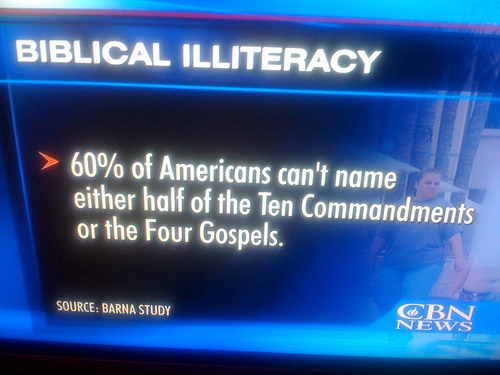As I try to dream and imagine what kind of “church” model best fits my personality and the cultural and historical context in which I find myself, I have slowly yet systematically stripped away everything I know and believe about how church has been traditionally done, and even how it is being done in the most innovative and progressive churches of our day.
In the process, I have found one question to be more helpful than anything else. It is a helpful question in developing a vision for church, but a dangerous question due to where it might lead. Do you want to ask it?
First, before you can ask the question, you have to clear your mind of everything you think you know about church. Start with as blank a slate as possible. Then, you have think about everything you know about God’s character: His mercy, love, grace, righteousness, and justice. You have to be willing to let people be people. You cannot coerce people, or force them to do what you want.
With “church” gone, and your mind filled with the character of God, ask yourself this question:
If I were God, how would I want church to look?
In other words, if you were God, and you were dreaming up how you wanted the church to be, and what you wanted the church to do in this world, how would it look? Since all power and knowledge are at my disposal, how would “church” look? What instructions would you provide?
 What non-negotiables would you require? What would be the best way for God to expand His rule over the earth?
What non-negotiables would you require? What would be the best way for God to expand His rule over the earth?
Once you have done this sort of brainstorming, look at your description.
That is the kind of church God wants you to be. You have just discovered what God might want to do in this world through you.
When Jesus came to this earth, He came to reveal God to us, and when He left, He told us to do the same thing. We need to reveal God to the world, and live like God to the world, to live the way we think God would live.
This way of visioning the church can also be applied to other theological and missional questions which are not necessarily about the church, but about God’s work in the world. For example, let’s say that you want to end global poverty. How would you do it if you were God? Rain down money from the sky? Is free money really the answer for the world’s poor? Maybe there is a better, wiser way to end global poverty. If so, what is that better way?
None of this, of course, means that your answers are the right answers, or that your solutions are the best way forward. But this process gets you thinking in a visionary way.
Here is a video where people ask this sort of question. Interestingly, God has actually done some of the things the people suggest… but the most beautiful thing about the video is to see their eyes light up and wonder about the possibility.
Guess what? By trying to do some of the things we imagine God should be doing, God is actually doing those things through us!





















 The thing that attracted people to Jesus was not His beauty, His eyes, His stature, His glowing clothes, or angelic halo. He had none of these things.
The thing that attracted people to Jesus was not His beauty, His eyes, His stature, His glowing clothes, or angelic halo. He had none of these things.

 Somewhere along the way, showing love to others requires that we also show love to our neighbors. It is a tragic reality of most Christians that while we spend hours at church hearing and studying about loving and serving the community, very few followers of Jesus know the names of the people who live in the homes on either side of them, let alone the needs, worries, and concerns that they have about their health, they job, their marriage, their children, or their finances. So along with loving our families, we can also making
Somewhere along the way, showing love to others requires that we also show love to our neighbors. It is a tragic reality of most Christians that while we spend hours at church hearing and studying about loving and serving the community, very few followers of Jesus know the names of the people who live in the homes on either side of them, let alone the needs, worries, and concerns that they have about their health, they job, their marriage, their children, or their finances. So along with loving our families, we can also making 
 We fill a large bowl with candy bars. Sometimes there is a neighbor who will not get home from work until later in the evening, and she gives us a package of candy to hand out for her. In addition to the circle of chairs, we set up tables to hold the food and carved pumpkins, fiber-optic pumpkin heads, and cats.
We fill a large bowl with candy bars. Sometimes there is a neighbor who will not get home from work until later in the evening, and she gives us a package of candy to hand out for her. In addition to the circle of chairs, we set up tables to hold the food and carved pumpkins, fiber-optic pumpkin heads, and cats. And we do! Simply by spending time with, eating with them, and sharing life with them, we get to know them. Inevitably, we have conversations about life – including the meaning of life and its problems and where God is in all of that, hopes, needs and a variety of other issues. These all take place before, during, and after these events.
And we do! Simply by spending time with, eating with them, and sharing life with them, we get to know them. Inevitably, we have conversations about life – including the meaning of life and its problems and where God is in all of that, hopes, needs and a variety of other issues. These all take place before, during, and after these events.
 When someone finds out you are a Christian, how do they respond?
When someone finds out you are a Christian, how do they respond? Frankly, I have the hardest time connecting with these people, because once they know I have been a “religious” leader, it seems that all they want to do is talk about devoted and dedicated they are. I find that I am often the one trying to change the subject to sports or the weather, but they keep bringing it back to their own religious efforts (e.g. “Yes, it is hot, and I’m so glad, because I prayed for good weather today.”)
Frankly, I have the hardest time connecting with these people, because once they know I have been a “religious” leader, it seems that all they want to do is talk about devoted and dedicated they are. I find that I am often the one trying to change the subject to sports or the weather, but they keep bringing it back to their own religious efforts (e.g. “Yes, it is hot, and I’m so glad, because I prayed for good weather today.”) Well … actually … it is true.
Well … actually … it is true.